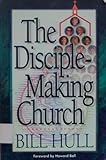Renewal Thru Ministerial Priorities

Tackling Major Ministry Areas Singularly
In the past sessions of this series, Renewal Thru Biblical Priorities and Renewal Thru Teaching Priests, we saw the importance of creating awareness for the tools for renewal for the church. First, we examined that the place to start in reviving a local fellowship is with an extensive and intensive focus on biblical literacy. Second, we clearly saw the needed priority in investing as much time as possible in teaching our people the word of God.
This leads us to the importance of creating a relevant and widely accepted statement of purpose in order to accomplish the task of discipling the congregation through Christian Education. If properly undertaken, the end result of this process is that the church will have an over-arching ‘direction pointer’ that will give clarity, focus, and guidance to all it does. With the exception of increasing the biblical literacy of any given congregation, formulating this statement of purpose is one of the first tasks that we need to engage in as leaders.
In establishing a purpose statement, we need to begin to answer the question, “Why?” Focus on why you’re in the business of discipling the church through Christian Education in the first place. Purpose statements do not evolve overnight. They take time. Once the big picture has been presented and the leader’s conviction sets in, then the teaching ministry’s direction should be known and established throughout the congregation. Print the purpose statement in brochures, flyers, and church bulletins. “This is why we’re here!” “This is what we believe!” “This is what we’re committed to!”
Having an effective statement of purpose, however, will not, in and of itself, guarantee the steady progress of renewal and growth within the local church. The day in and day out workings of a church also need to be governed by carefully chosen priorities that will enable the church to achieve its purpose.
Choosing Specific Priorities
Many different areas of ministry fall within the stated purpose of any church. It is our responsibility, as leaders, to guide our congregation in choosing specific priorities for the local church.
Within the confines of the local church’s purpose, there needs to be a focus. When we are working for renewal within a mainline church, in most cases only one priority can be focused on at one time. Effectiveness comes when we as the leaders of a congregation are able to tackle one major ministry area at a time.
Too often, not prioritizing our ministries leaves us feeling like circus jugglers trying to keep six or eight balls in the air all at once. The result is that every single ball gets dropped, and nothing of significance gets accomplished. If we attempt to cover all the ministerial bases at the same time we are fools.
As leaders we can learn a lesson from studying the way in which the lions hunt their prey. The very first thing they do before they spring into action is focus on the one animal they intend to bring down. There may be thousands of animals at a particular watering hole—wildebeest, zebras, gazelles, and antelope. Lions choose only one animal however, and then, and only then, do they attack.
While the chase is on, dozens of other animals might cross their path within much closer reach than the prey they have focused on. A tasty antelope may rush by or a delectable gazelle may jump before them. But the lions refuse, however, to be distracted by these tempting animals. They let them pass by without giving them a second thought. They deliberately choose to remain focused on the target prey. The reason lions are able to stay alive for so long is that they have learned how to focus on one animal at a time.
As leaders in search of renewal for our churches, we need to do exactly the same thing. The shotgun approach to ministry will simply scatter our efforts rather than get the job done. We must employ the sniper approach by singling out the very target that matters and take careful aim before we shoot. We need to choose one ministry area at a time, and throw the majority of our efforts into that area.
Doing "One Thing" Right
I like Kentucky Fried Chicken’s old advertising slogan which said, “We do one thing, and we do it right.” They did not mess around with roast beef or burgers, pizzas or tacos, adobo or lumpia. They focused on chicken and just chicken alone. That was the secret of their success. We should have those words indelibly fixed in front of us everyday: “Do one thing, and do it right.”
Focus all discretionary time on one priority. What this practically means is that: (1) We are going to have the ability to properly diagnose the health of our own local church and make a decision regarding what priority should be tackled first; (2) we are going to have to be tightly connected with God in order to be able to endure the criticism that we will inevitably elicit, by forsaking other ministry areas in order to focus on the important; and (3) we are going to have to be willing to sacrifice other very important ministries and people in order to stick with our priorities. We will have to learn to live with the fact that other urgent ministry areas are not going to be covered, so that we may focus on the one priority we believe to be the most important.
Learning To Say "No"
This is a painful reality. Successful leaders have learned how to say “no,” not because other areas are unimportant, but because they are not the most important. They know that oftentimes, the good is the enemy of the best.
Dr. Colin Brown, one of my seminary professors at Fuller, shared this piece of wisdom to his students saying, “Now I just have something to say about church work. I have been ordained since 1958 and have continually been in church work and my testimony is this: ‘Most churches and Christian organizations will take you for all you’ve got and come back for more if you let them. So just keep bound an eye on yourselves in what you can reasonably do.’” Many ineffective leaders are unable to say “no” to other people. They are unable to turn a deaf ear to a genuine need. They are unable to not minister to needy people. Having this type of heart, while exemplary in many ways and aptly suited for being a small group leader, is a sure-fire recipe for failure in the calling to awaken and grow a sleeping mainline church.
One of the unsung heroes of the American Civil War was the battlefield surgeon. His was the gruesome task of patching up what the bullet had torn apart. Before entering a body-strewn battlefield, every surgeon had to be absolutely clear about his priorities. In the heat of the moment, with dozens of wounded men screaming for his attention, it was crucial that he had to decided ahead of time what he would do, and what he would not do.
The battlefield surgeon knew that he would encounter three types of injured soldiers: (1) Those with superficial wounds who would live without his attention; (2) those with such serious wounds that no matter how much attention he gave them, they would die anyway; and (3) those with serious wounds who could be saved by his immediate attention.
All three groups of injured soldiers would scream for his attention. He could not, however, attend to them all. Because he had decided before the battle that working with the third category of soldiers would do the most good, he passed over the first and second group of soldiers, ignoring their screams for help. While the sentimental observer would think him cruel, he knew that if he was going to save the maximum number of men’s lives, he would have to pass over many seriously injured soldiers in order to work with those that he could save.
This is a rather extreme example, but the principle holds for us as leaders in the mainline wanting our congregations to experience renewal and growth.
I usually focus my energies on one new ministry priority each year. At first it was the biblical literacy of our young adults. Later the focus was on strengthening small groups, and then missions. At this writing, it is the church’s leadership development in a school established for the training of laypeople within our churches in the Greater Los Angeles area.
Each time I chose a specific priority, it meant saying “no” to many other very good and necessary ministries. Some of these could be delegated and others given a token amount of time. Many, however, were simply not attempted at all.
Working for renewal in dried-up mainline or house churches, we must be willing to answer the intensely difficult question that Peter Drucker puts forward in his book entitled Managing in Turbulent Times, “What are we going to abandon so we can engage in this new activity?” Being able to choose a focal ministry and persevere with it until it is healthy will advance the kingdom of God far more in the long haul than attempting to be “all things to all people all of the time.”
Know where your people are. Spend time with the Father. Choose a priority based on your walk with both your people and with God. Throw every fragment of your resources into that priority. Hang on for the long haul, enduring criticism. Watch how God rewards this single-minded approach to what you are going to attack and what you are going to abandon.
Early on in the book of Mark 1:35-38 do we read about Jesus’ single-mindedness of heart: “In the morning, while it was still very dark, he got up and went out to a deserted place, and there he prayed. And Simon and his companions hunted for him. When they found him, they said to him, ‘Everyone is searching for you.’ He answered, ‘Let us go on to the neighboring towns, so that I may proclaim the message there also; for that is what I came out to do.’”
Jesus had every opportunity to stay his welcome in a small fishing village. He had a captive audience as the whole city was gathered outside his door. He could have set-up shop inside the home of Simon’s mother-in-law whom he had just healed. He happened to be embraced as “Capernaum’s Most Valued Young Man.” He probably made it to the city’s “A” list. Everyone sought him out or clawed their way toward him. Yet he deliberately closed the door to a multitude of ministry opportunities in this town and opened the way for the word of God to be proclaimed throughout the neighboring towns.
Jesus clearly understood his priorities from his Father in heaven and did everything that was pleasing in His sight. For to proclaim the message was what he came into this world to do. Jesus’ priorities and purposes were in order. Likewise, we ought to prioritize the proclamation of God’s word wisely, do the one thing right, succeed as leaders by learning to say “no,” and abandon the good for the very best.
© 2009, Gicky Soriano. All rights reserved.
Renewal related hubs:
- Renewal Thru Fine-Tuned Focus
In the past we have seen the importance of thinking through, developing, and articulating a concise statement of purpose that will enable the church to stay the course. We have seen the importance of the... - Renewal Thru Teaching Priests
I can remember quite clearly my first six months of ministry in a Filipino American church in the Greater Los Angeles County. I had just completed a course in Fuller Theological Seminary entitled Foundations... - Renewal Thru Biblical Literacy
The first place to start in reviving a local fellowship is with an extensive and intensive focus on biblical literacy. Unless we develop a biblically educated congregation, anything else we do will be...
Recommended reading:









